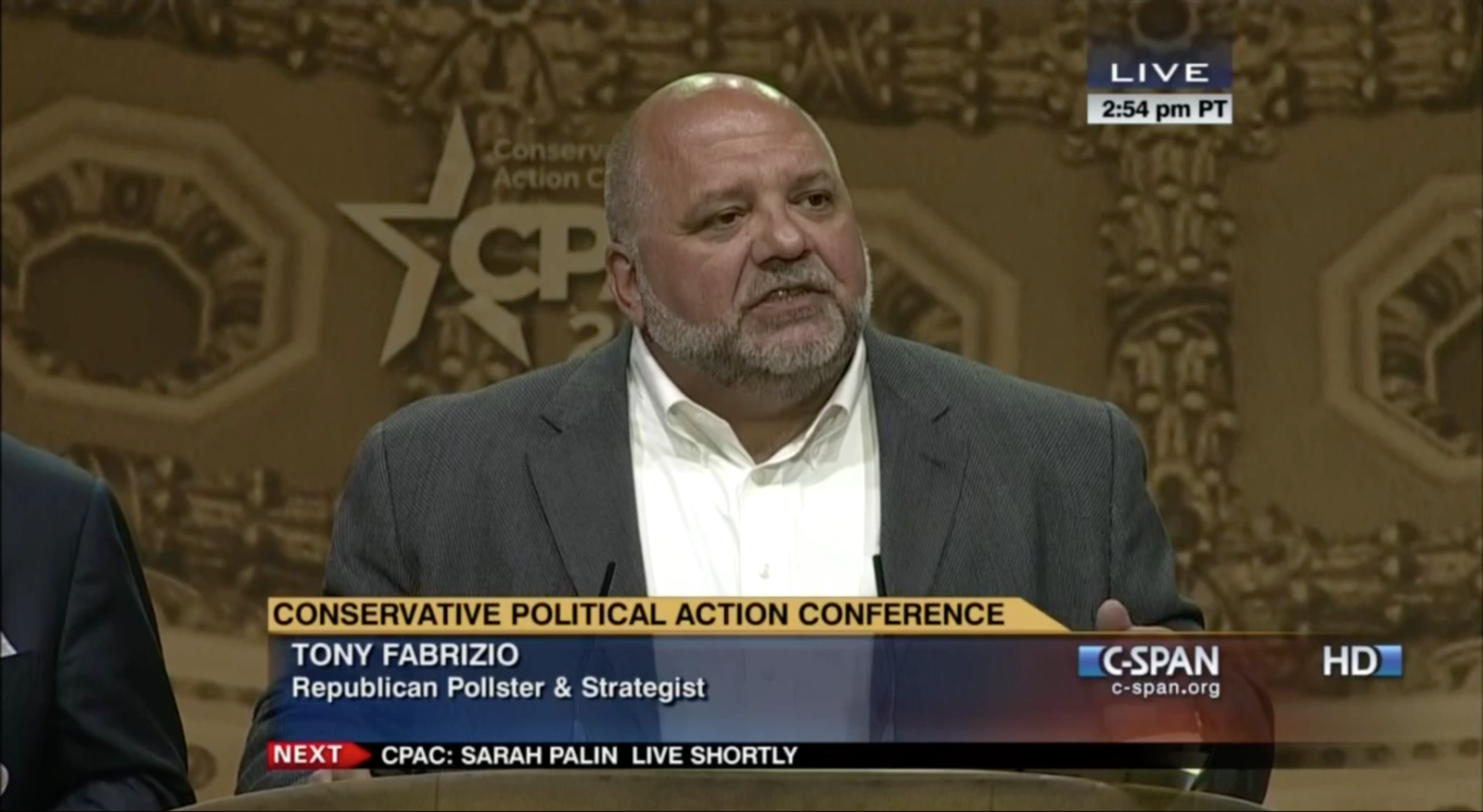The Center for Individual Freedom (CFIF), a conservative advocacy, lobbying, and electioneering group led by a strategist for Donald Trump’s presidential campaign, has lobbied for both the Dakota Access and Keystone XL pipelines.
Tony Fabrizio, a veteran Republican tactician and lead pollster, chairs CFIF’s Board of Directors, according to its 2017 incorporation filings, submitted in Florida. Documents from the state show that Fabrizio signed off on CFIF’s forms back in 2004.
According to federal lobbying disclosure forms, the group’s team of lobbyists, at the end of 2016, engaged with then-President Barack Obama’s staff to express “concern with ongoing violent protests and obstruction of the Dakota Access Pipeline and [to urge] allowance of construction to continue without any further delay.”
U.S. Federal Election Commission filings show that Trump campaign’s latest payment to Fabrizio’s polling firm occurred in March, in the sum of $450,000. The New York Times reported that Fabrizio has worked sporadically as an adviser to President Trump since 2011, when Trump first began considering running for the office.
Fabrizio did not respond to a request for comment for this story.
Dakota Access Push
In September, about a month before officially filing to lobby for Dakota Access, CFIF wrote a blog post criticizing those protesting the pipeline at the Standing Rock Sioux Reservation in Cannon Ball, North Dakota.
“When is enough enough?” wrote CFIF’s Timothy Lee, who is listed as a lobbyist for Dakota Access on its disclosure form. “When a rational person knows they aren’t going to win, that their point isn’t going to be heard, that they came up short — they throw in the towel. Sure, a toddler may continue to whine and cry, but an adult moves on.”
At the time, current U.S. Secretary of Energy, Rick Perry, served on the Board of Directors of Dakota Access co-owner Energy Transfer Partners. Fabrizio served as an adviser for Perry’s 2012 Republican Party presidential campaign.
After President Trump gave Dakota Access the green-light in January, CFIF sang his praises.
“Today, President Trump signed executive actions advancing the Dakota Access Pipeline, thereby helping restore faith in due process of law,” Lee said in a press release. “Company officials followed the letter of the law in their completion of the approval process, and it is a relief to see that diligence recognized by President Trump.”
A spokesperson for Energy Transfer Partners told DeSmog she was not familiar with CFIF and the company did not retain the group to lobby on its behalf. Reached by email, CFIF told DeSmog that it lobbied for Dakota Access independently of Energy Transfer Partners and was not hired by the company to do so.
“The Center for Individual Freedom is an independent advocacy organization and the direct lobbying we do is on behalf of our mission. Consequently, CFIF has never been retained by anyone,” said Jeffrey Mazzella, president of CFIF and member of the organization’s Dakota Access lobbying team. “Tony Fabrizio is not a registered lobbyist for the organization, and does none.”
Oil Export Ban, Keystone XL
In 2015, CFIF deployed lobbyists in what ended up being a successful push to repeal the U.S. crude oil export ban that had been in place since the oil crisis of the 1970s.
Harold Hamm, lead energy adviser for Trump’s campaign and CEO of hydraulic fracturing (“fracking”) giant Continental Resources, led the way in funding the public relations campaign to repeal the export ban. Oil from the Bakken Shale is now being exported to Asia, and the opening of the Dakota Access pipeline, which carries Bakken oil, is expected to boost the flow of oil for export. As previously reported by DeSmog, Continental Resources — which has its sights set on shipping crude oil to South Korea — has oil flowing through Dakota Access.
“There seems to be increasing demand for light quality crude in Asia,” Michael Cohen, head of energy commodities research at Barclays, recently told Reuters. “I think with Dakota Access coming online, it makes the pipeline route from the Bakken to the Gulf Coast more economical.”
During the second quarter of 2012, CFIF also lobbied for Keystone XL, which President Trump has recently approved. CFIF advocated by “urging that Keystone XL Pipeline approval language be included in the final version of the Highway Bill,” according to lobbying disclosure forms.
Previously, CFIC has also lobbied against renewable energy tax credits and President Obama’s Clean Power Plan, which was set to regulate carbon emissions from coal-fired power plants.
The firm Mercury Public Affairs, where Fabrizio works as a senior counselor, currently maintains fossil fuel industry clients. These include New Jersey Natural Gas, Penn East Pipeline Company LLC, and the Government of Qatar, which co-owns with ExxonMobil the Golden Pass Liquified Natural Gas export terminal, which Perry’s Department of Energy recently approved.
Bryan Lanza, communications director for President Trump’s transition team, was recently hired by Mercury as well.
Tobacco Past, Climate Denial Present
CFIF’s roots trace back to the tobacco industry, with the group founded in 1998 by Thomas Humber, who was then a public relations professional for the National Smokers Alliance (NSA). The Smokers Alliance was created and funded by tobacco giant Philip Morris, according to documents housed in the University of California-San Francisco’s (UCSF) Truth Tobacco Industry Documents archive.
A 2013 study published by the British Medical Journal revealed that marketing efforts for the Smokers Alliance were led by public relations firms such as Burson-Marsteller and Ailes Communication, the latter the namesake of former Fox News Chairman and CEO Roger Ailes. Ailes served as an adviser to Trump’s presidential campaign.
The paper also highlights that the Smokers Alliance closed its doors in 2001, handing off some of its cash to CFIF.
“We regret that the [Smokers Alliance], as an organization, must end, but that does nothing to diminish the commitment to Individual freedom that has driven the NSA,” reads a 2001 memo written by Humber, also published by UCSF.
“‘The effort to disenfranchise and marginalize smokers is, in reality, only one facet of a much broader assault on individual freedoms that has begun to infuse this society. Consequently, upon dissolution, the NSA will contribute some remaining assets to the Center for Individual Freedom, a 501(c)(4) corporation that supports the constitutional freedoms that all Individuals must enjoy.”
Today, CFIF is active in denying the scientific reality of climate change, calling it “political science” as recently as January 2016.
“When we talk about global warming, or global cooling, or global climate change broadly, we’re not talking about science so much as ‘political science,’” wrote CFIF in a blog post. “Science so far hasn’t been able to say with certainty why the earth’s climate may be warming. Many of the computer models predicting, for example, a precipitous decline in Antarctic sea ice have been wrong.”
This climate denial–tobacco connection is not unusual. Many present-day climate deniers, such as those at CFIF, formerly worked on the payroll of Big Tobacco, which is explored in depth in the 2010 book Merchants of Doubt: How a Handful of Scientists Obscured the Truth on Issues from Tobacco Smoke to Global Warming.
Main image: Tony Fabrizio. Credit: C-SPAN Screenshot
Subscribe to our newsletter
Stay up to date with DeSmog news and alerts






